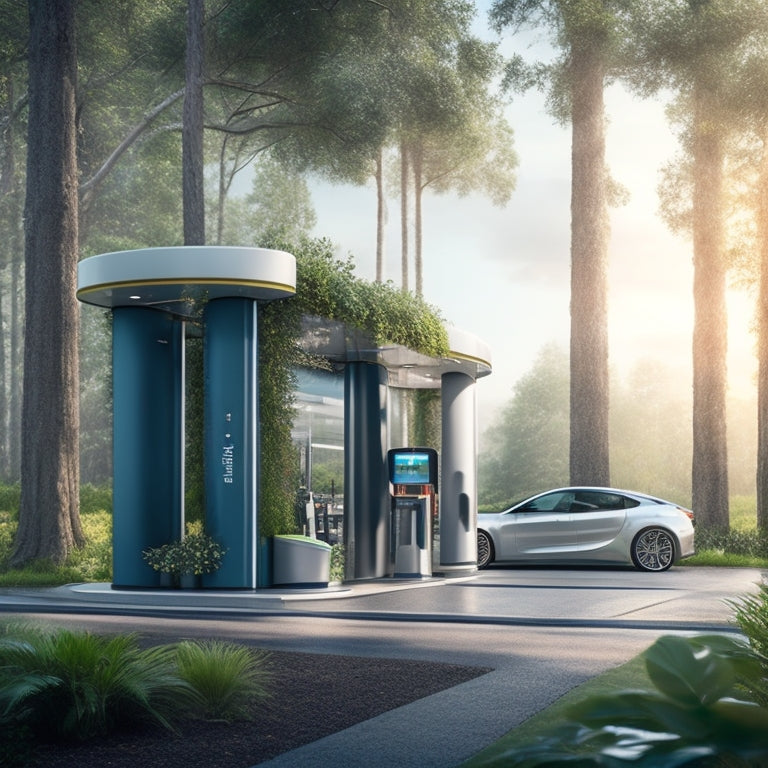
3 Essential Tips for EV Charging Station Design
Share
You're designing an EV charging station that meets the evolving needs of electric vehicle owners, and to get it right, you need to focus on three essential aspects. First, guarantee seamless solar integration by optimizing your solar panel array's maximum power point tracking and planning strategic panel placement. Next, optimize station energy efficiency by implementing smart charging systems and load management strategies. Finally, prioritize user safety by incorporating safety features, accessible signage, and clear navigation paths. By mastering these three key areas, you'll be well on your way to creating an efficient, sustainable, and user-friendly EV charging station – and there's more to explore.
Key Takeaways
• Optimize solar panel array's maximum power point tracking (MPPT) to maximize energy output and reduce energy losses.
• Implement smart charging systems with dynamic power output adjustment to ensure efficient energy distribution.
• Prioritize user safety by incorporating safety features, clear signage, and accessible navigation paths in the station design.
• Integrate energy storage solutions to store excess energy and utilize advanced weather forecasting for optimized charging schedules.
• Ensure a secure and trustworthy environment by installing emergency stop buttons, fire extinguishers, and first-aid kits.
Ensuring Seamless Solar Integration
As you design an EV charging station, integrating solar power seamlessly requires careful consideration of the solar panel array's maximum power point tracking (MPPT) to guarantee peak energy harvesting.
You'll need to strategically plan Solar Panel Placement to maximize energy output. Make sure the panels are angled and positioned to capture the most sunlight throughout the day.
A well-designed Energy Harvesting System will enable you to harness the sun's energy efficiently. By optimizing MPPT, you'll minimize energy losses and maximize the station's overall performance.
Optimizing Station Energy Efficiency
To optimize energy efficiency at your EV charging station, you'll need to implement smart charging systems that can dynamically adjust power output based on factors like time of day, energy demand, and grid stability. This will help reduce strain on the grid and minimize energy waste.
To take it to the next level, consider the following strategies:
-
Implement Load Management Strategies to distribute energy demand evenly throughout the day
-
Integrate Energy Storage Solutions to store excess energy generated during off-peak hours
-
Utilize advanced weather forecasting to optimize charging schedules
-
Leverage real-time data analytics to identify areas of inefficiency
-
Incorporate solar or wind power to supplement your energy needs
Enhancing User Experience Safety
By incorporating safety features that prioritize user protection, you can create a secure and trustworthy environment at your EV charging station. Guarantee accessible signage is prominently displayed, providing clear instructions and warnings to users. This will help prevent accidents and minimize potential hazards.
Implement clear navigation paths to guide users through the charging process, reducing confusion and anxiety. Consider installing emergency stop buttons, fire extinguishers, and first-aid kits to provide an added layer of safety.
Frequently Asked Questions
Can EV Charging Stations Be Installed in Residential Areas?
As you 'spark' curiosity about EV charging stations, you'll find that, yes, they can be installed in residential areas, but you'll need to address homeowner concerns and maintain harmonious neighborhood aesthetics.
How Do I Obtain Necessary Permits for EV Charging Station Installation?
You'll need to research local zoning laws and building codes to obtain necessary permits for EV charging station installation; guarantee compliance by submitting plans and paying required fees to relevant authorities.
Are EV Charging Stations Compatible With All Electric Vehicles?
You'll be pleased to know that most EV charging stations are designed to be vehicle-agnostic, using universal adapters to guarantee compatibility with various electric vehicles, making it easy for you to charge your ride.
Can EV Charging Stations Be Used for Commercial Businesses?
As you venture into the commercial world, you'll discover that EV charging stations can be a lucrative addition, offering Business Benefits like increased foot traffic and Customer Attraction, making your business a go-to destination.
Do EV Charging Stations Require Regular Maintenance or Inspections?
As you operate an EV charging station, you'll need to prioritize safety protocols, adhering to maintenance schedules and inspection frequencies to guarantee electrical checks are done regularly, minimizing failure rates and ensuring reliable performance.
Related Posts
-

7 Best Automated Sprinklers for Water-Wise Green Homes
You're likely among the 75% of U.S. homeowners who use in-ground sprinkler systems, and coincidentally, you're also c...
-

10 Green Waste Solutions Every Homeowner Should Know
You can make a significant impact on the environment by implementing green waste solutions at home. Consider composti...
-

What Air Purifiers Save Energy in Work Areas?
You can cut energy costs and reduce your carbon footprint by choosing air purifiers designed with energy efficiency i...


